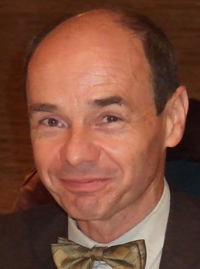
Premium Beauty News - You have been working for many years on the skin barrier and its functions.
Dr. Marek Haftek - The Laboratory "Normal and pathological functions of the skin barrier" integrated in the University Lyon 1, which I head, is trying to understand how work biological mechanisms that allow the skin to achieve its role as a body protector. It is a vital function, since the skin, especially its outermost part, the stratum corneum, or horny layer, is both a protection against the risk of massive loss of body fluids, and a protection against external aggressions.
The stratum corneum’s malfunctions are very interesting to study from a scientific point of view. They can of course be the result of diseases, but they can also be at the origin or self-sustain pathological processes.
Our research also focuses on analyzing the molecular components and their regulation, particularly in atopic dermatitis and aging. We also work on the protection against physical and chemical stresses and on the phenomena of transcutaneous penetration. The objective being to develop therapeutic and industrial applications oriented on the barrier function of human epidermis.
Premium Beauty News - What is the importance of this barrier for cosmetics?
Dr. Marek Haftek - This barrier is the skin’s surface, it is actually what can be seen. The malfunctioning of biological functions that produce it may have unattractive consequences which are at the heart of cosmetic issues. Understanding the biology of this barrier is obviously useful to prevent damage suffered by skin with age or as a result of external stresses.
The skin surface forming the barrier is composed of "dead" cells as a result of biological processes pre-programmed within underlying living cells. A number of dysfunctions are likely to affect these complex processes and induce disturbances and inconveniences ranging from simple dry skin, with the discomfort associated to it, to severe allergies to different substances, including skin redness or unsightly flaking. Cosmetic products will try to correct the consequences of these dysfunctions, by providing for example lipids that will integrate the stratum corneum, reinforcing its hydration, to make it more supple, thus improving its appearance while providing extra comfort.
We can go even further. This is the reason why we are also studying the penetration process of cosmetic or pharmaceutical products, to target the passage of some molecules ensuring the skin’s appropriate functioning.
Premium Beauty News - Do aggressions against this barrier have a tendency to increase?
Dr. Marek Haftek - Unquestionably. In fact, the skin is more and more assaulted. Firstly, people in developed countries live in an increasingly complex universe from a chemical point of view, with a proliferation of allergens and aggressive substances in their environment. Other factors, such as dryer air coming from heaters or air conditioners affect the skin condition. In developed countries, atopic dermatitis is growing exponentially.
Premium Beauty News - And the exposure to UVs?
Dr. Marek Haftek - It also influences the skin condition, but in a different way. Indeed, one of the important functions of the stratum corneum is to protect underlying tissues from ultraviolet radiation. The horny layer absorbs about 70% of UV-Bs, but the rest passes through and can induce significant damage. Not to mention UV-As and infra-red radiations that penetrate more deeply and act on the dermis.
Our laboratory, which comprises mainly researchers specialised in skin biology and galenical pharmacists, is taking a very great interest in how the skin barrier manages to cope with all these stresses, and how it is possible to strengthen natural defences.
Premium Beauty News - What are the current issues of research on the barrier function of skin?
Dr. Marek Haftek - The main scientific challenge is to better understand interactions between the different elements that contribute to the production and function of the skin barrier. We have a pretty good picture of the role played by each element, but it is still unclear to us on how the modification of one of these elements interacts on the others to achieve the appropriate final function. Such an important mechanism for the survival of the human being can not just depend on a single element! The impairment of a link may well modulate the function but shouldn’t abolish it.
For this reason, we learn a lot from genetic diseases that affect a particular function. The increasing development of atopic dermatitis is also insightful. It was recently discovered how the mutation of a gene (that of filaggrin) can induce dysfunctions of the skin barrier and make people very vulnerable vis-à-vis substances in their environment.
Premium Beauty News - Specifically, what are the topics of current research in your lab?
Dr. Marek Haftek - Concerning the topics of research we can name:
– The differentiation and epidermal extracellular matrix (Marek Haftek, Sylvie Callejon),
– The barrier functions in normal human epidermis and in atopic dermatitis (Marek Haftek, Sylvie Callejon, Jacques Portoukalian),
– The roles of dendritic cells in defence, allergy and tolerance (Josette Péguet, Claude Vincent, Aurore Rozières, Florence Persat, Evelyne Colomb),
– The transcutaneous penetration and the galenic formulation of nanoparticles for therapeutic and diagnostic purposes(Françoise Falson, Fabrice Pirot, Valérie Bertholle, Karine Padois),
– The clinical and pathological aspects of composite grafts and of side effects of immunosuppression (Sylvie Euvrard, Jean Kanitakis),
– Melanoma (Luc Thomas).
In addition, we organize every year in Lyon, a course in French language of skin biology (CoBiP) [1]. Like the European Dermocosmetology Days, who will soon take place in Lyon [2], this course contributes to the promotion of excellence in the Rhone-Alpes region in dermocosmetology. Indeed, the Lyon region features unique assets with the presence of several major laboratories specialized in skin and with advanced research centres on the biology and chemistry of proteins. Basic and applied public research is particularly developed: skin substitutes and skin substrates, collagen-based biomaterials, formulation (topical forms of products), active ingredients, skin diseases - cancers and allergies, skin/graft/immune suppression relations, etc. The region has an exceptional expertise in the field of dermatological research and cosmetic products, it is important to make the promotion of it!




























